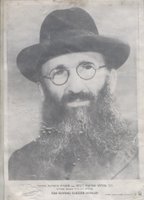Well, it’s almost Log B’Omer and for me that means basically two major things: I can trim my beard and start listening to music again.
This year during sefira I did something I had not done before. Several years ago I heard an interview with Stephen King on NPR. He mentioned that he often makes a list of what CDs or songs he listens to on a monthly basis and sees if it influences what he writes. I thought that was a pretty cool idea at the time, but left it at that.
This year I tried to write down on, when I could, what songs popped into my head and what triggered them. Silence, or in my case, lack of listening to anything besides some acapella tracks and shiurim, tends to clean out my mind.
Certain songs kept popping in my head during the past few weeks. Lot of niggunim from Songs of the Rebbes by Piamenta and several instrumental songs also from Strings of my Heart. Reb Shlomo Carlebach’s songs got constant air-play in my mind, as did D’vekus.
I find it interesting that although I listen to more “modern” Jewish music, it was these older classics that I found myself humming.
Now, for the secular non-Jewish music..
As I mentioned, I tried to keep track of what triggered the music that came in my head. Here’s a random list and what prompted me to think of the song or lyrics:
“Driver 8” (R.E.M)- I was driving home from work as saw a kite stuck in a phone/power line and thought of the lyrics “powerlines have floaters so the airplanes won’t get snagged”.
“I am a Rock”” (Simon and Garfunkel)- As I was thinking isolation and The Lonely Man of Faith one day and this just crept in my brain.
“De Do Do Do, De Da Da Da” (The Police)- playing with the 7 month old babyUberdox and listening to her babble.
“Until the End of the World” (U2)- My son told me that his baseball card collection would be around until the end of the world and automatically this song started up.
“I Don’t Know What You’re Talking About” (Husker Du)- One night after the kids had gone to bed I was thinking about Rabbi Akiva’s lost talmidim that we are mourning and these profoundly simple lyrics, “There’s more to life than being right and wrong. There’s something in between called getting along,” came to mind.
Finally, several songs by a certain seminal Brittish punk band- I heard a commercial on the radio for Virgin Atlantic Airways with a testimonial by guitarist Steve Jones.
What’s the point of all this? Well, even though most of these songs I haven’t listened to in almost a decade (with the exception of the Husker Du track), have stayed stuck in my head. It’s kind of scary when I think about it. A song tune or lyrics can re-surface in my brain after staying dormant for years, yet I have trouble memorizing pasukim from Chumash or Tehillim. As I wrote, it’s scary. I find this to be pretty good mussar for myself.
By the way, as I was thinking of a title for this posting the original choice was “What’s Going On (Inside My Head)”, but that is the title of a Husker Du track. Then I thought about “iPod of the Mind”, as a reference the poetry book “Coney Island of the Mind” by Lawrence Ferlinghetti.
Then it became “An iPod in my Mind”, but then the song “Carolina in my Mind” by James Tayor popped in my head and I don’t really even know all of the lyrics. Oy Vey!








